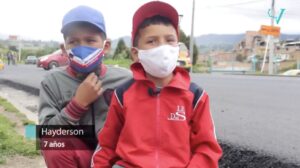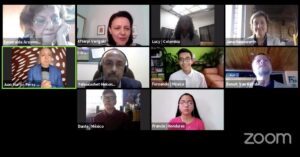Author: School of Journalism for girls and boys.
Publication date: May 2021
Context: In Latin America and the Caribbean, access by girls, boys and adolescents to Information and Communication Technologies (ICT) has increased. In general terms, from 2010 to 2016 the number of households connected to the internet grew by 103% in the region and, Guatemala, Bolivia, Nicaragua and Honduras were the countries with the highest growth, although they continued below the 30% of coverage according to a study ECLAC (2015).
In this context, it is essential to inquire about the strategies, methodologies, approaches and / or public policies on digital citizenship that involve these populations from a gender and children's rights perspective, in order to present qualitative categories of analysis that complement indicators to evaluate comprehensively.
Although, access to ICT continues to be a privilege (Pavez, 2014) by generating digital gaps (Red Natic, Save The Children and Asociación Chicos. Net, 2015) and accentuating gender gaps (ECLAC, 2013 and Red Natic, et al. al. 2015), its use and appropriation are part of the daily life of certain girls, boys and adolescents in the region. In this regard, it seeks to contribute to the understanding of their digital citizenship beyond our adult normative frameworks and in order to build generational bridges that allow us to build free and safe spaces. in Y with technologies, not just guarantee access.
And within this framework, understand that girls and boys are already powerful, so that ICTs function as extensions of this empowerment. For this reason, adult accompaniment is essential throughout the construction of their digital citizenship, which is understood beyond the age, whose condition they construct in social and political terms as subjects of law in accordance with the Convention on the Rights of the Niño (1989) and social agents based on a social perspective.
Purpose: Based on the brief context indicated, the purpose is to identify strategies, methodologies and / or approaches on digital citizenship by girls, boys and adolescents to assess their status in Latin America and the Caribbean from a gender and rights perspective. In this framework, various questions arise from which the study will be guided.
For example, we will begin by defining what we mean when we talk about digital citizenship by girls, boys and adolescents and what are the variables and / or categories, whose analysis will make it possible to identify methodologies, tools, approaches and / or public policies. In addition, the regional context will be presented in a general way to determine the involvement of the actors involved in the selected initiatives.
Of these regional initiatives, it will be identified what mechanisms they use, how they operationalize multidisciplinary cooperation and what are their quality processes, as well as their relevance. It is intended to carry out a documentary analysis with a view to answering in the final part, what are the limitations of said initiatives and to what extent they comply with the variables and / or categories of analysis from a perspective that considers both their protection and participation.
Methodology: This exploratory-descriptive report is part of an investigation based on the Rights of the Child (children's rights- based research) in order to carry out a documentary review in which the unit of study will be Latin America and the Caribbean, meanwhile; The unit of analysis will be made up of the sources collected on digital citizenship by girls, boys and adolescents. Your design will be described in six steps below:
1. Keywords will be identified from digital citizenship by girls, boys and adolescents in the UNESCO Thesaurus and Google Trends to determine standardized conceptual forms in certain fields of knowledge and search trends.
2. A search will be carried out based on the key concepts identified in order to obtain a sample. Initially, as selection criteria, empirical studies with declared methodologies, productions from Latin America and the Caribbean, and literature, preferably in Spanish, from the last ten years are considered.
3. Methodologies, tools, approaches and / or public policies on digital citizenship will be selected by girls, boys and adolescents from Latin America and the Caribbean in the sample obtained.
4. Analysis categories and / or variables will be determined in the sources collected from a saturation criterion.
5. The selected initiatives will be systematized through analysis matrices, in order to assess mechanisms, operability, quality processes and relevance.
6. The information collected in the analysis matrices will be compared using the categories and / or variables determined, as well as the context with a view to triangulating the information and issuing recommendations.


